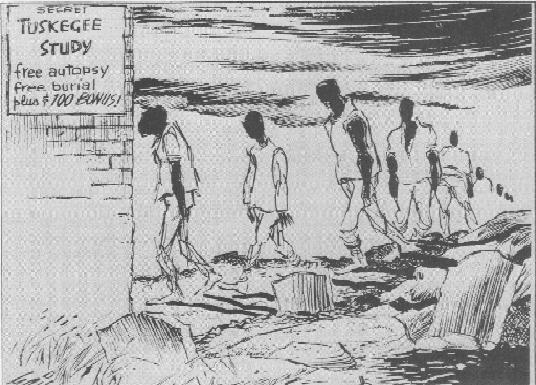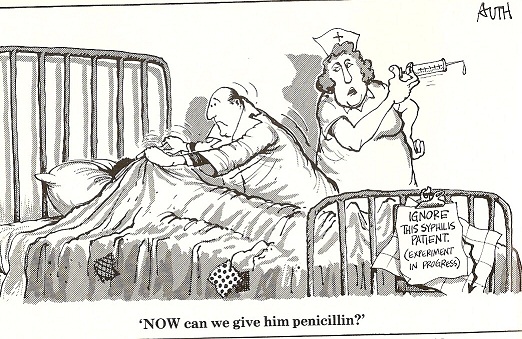Years ago before there was a treatment for syphilis, the American government conducted an experiment which raised a significant moral question. In the 1930s and 1940s hundreds of black men in the South were brought in and told they were being treated, but actually it was research to follow the progression of syphilis until they died. When penicillin did become available to treat syphilis, these poor men were still not treated. What does it say about scientists and doctors when the research becomes more important than saving lives?
The Nazis set the standard for despicable behavior, and one of the most despicable was the human experiments. Imagine being forced to take untested drugs, or being injected with fluids to see if your eyes would change color. Of course there was no informed consent, as the Nazis treated their Jewish prisoners as sub-human. Like the Japanese internment camps, Americans have another black mark in human experimentation, and this is the Tuskegee experiment.
In 1932 in a rural county in Alabama, the US Public Health Services recruited 412 black men who had syphilis along with 200 others who didn't have syphilis. They were attempting to replicate a study done in Norway on the long term effects of syphilis. The government paid for them to get transportation to the clinic, hot meals, and money to ensure they could be buried in caskets, not seed bags. The men were told they were being treated for "bad blood". They were never told they had syphilis. They were never treated at all for the disease. The only medicine they were given was placebos.
There was no effective treatment for syphilis in 1932. Still the men were not told that they were being studied and were not told the real nature of the disease they had. There were no laws for research that required a participant to give informed consent. The government and the researchers thought they were helping the men, since they couldn't effectively treat them anyway. The study was supposed to last for 6 months, but year after year it went on. Little by little, the men began to get sick from the disease. It was known that after the contagious period, syphilis would remain asymptomatic for years before it returned to make the person sick.
In 1947 penicillin was discovered to be an effective treatment for syphilis as well as a number of other infections. Penicillin. The most common anti-biotic used today was found to kill the syphilis infection. Now if you're the director of the Tuskegee study, or you are the US government underwriting the study, what do you do? At the start in 1932 there's no effective treatment for syphilis, but now in 1947 there is. Of the 412 men in the original study, many of them could be saved at this point. I think the easiest moral choice anyone can make is "try anything if you think you can save a life". Penicillin works against syphilis. Stop the study, give these men penicillin and try to save their lives.
Unbelievably, the researchers said the show must go on. In the name of science. It was now clear that the study's purpose was to follow the men until their death and autopsy them. The science of 15 years would be invalid if they gave the men penicillin to save their lives now, so the show must go on. In 1947 the US government sponsored rapid treatment centers to go out to the communities and administer penicillin so they could wipe out syphilis. The men in Tuskegee were prevented from getting penicillin by the researchers. The public didn't know about the study. The men didn't know they had syphilis and could be cured. There was no moral outrage because no one would know.
Many more years went by, as more men got sick and died. The government continued to fund the study with full knowledge there was treatment available. Finally in 1972 a whistleblower Peter Buxton, a venereal disease specialist who knew about the study, went to the press and the story was exposed by the Washington Post. A huge public outcry followed, Congress held hearings, and the study was terminated. The government tried to repair the damage by providing free medical care to the survivors and their families, but this dark chapter left a stain on Americans especially African Americans. Years later in 1997 President Bill Clinton formally apologized to the people in Tuskegee for the government's despicable acts. Just like the Japanese camps in World War II, the government sees the light of moral outrage years later. Why were they unable to see it while it went on?
The men who ran the study, including African American doctor Eugene Dibble, knew they would not be treating the men. Indeed there was no effective treatment for syphilis in 1932 when the study began. It was certainly in the moral gray area at this time. When penicillin did become available is when these people went off the moral cliff. Was it the science of studying syphilis until it kills so compelling? Or was it that the black men were expendable, like the Jews were in the Nazi experiments.
Nurse Eunice Rivers, also an African American, was a crucial part of the whole experiment. She recruited the men to take part in the study, gave them rides and hot meals, and generally earned their trust all the while keeping the real purpose of the study to herself. She stayed with Tuskegee for the whole period, providing support and comfort to the men as their health declined in the later stages of syphilis. A black female nurse in the 1940s was in no position to question the male doctors. Rivers' failure to take a moral stand against the study when penicillin would fall into the blind obedience category. She did make the choice to not quit altogether in 1947 and not tell the men or anyone else that the study was more important than saving their lives. Beyond that, she unwittingly enabled the study to go forward by earning the trust of the men, something the doctors were unable to do on their own. I find it hard to brand Eunice Rivers with the moral low ground. Her main motivation was love for the men she cared for.
The Tuskegee experiment represents one of the low points in our history. We pride ourselves in treating our people with respect and dignity, especially the most vulnerable. We pride ourselves in never reaching the moral depths that the Nazis did during the holocaust. In Tuskegee a group of poor black men were left untreated for a lethal disease when treatment was available. While Tuskegee was not as deliberate and sadistic as the Nazis, it was still a low point in our history.








SEOJULIETTEF
Welcome,
Interesting website, I find this webpage very informative and focused on topic.
BTW, I really like your layout of the website. Have a great day.